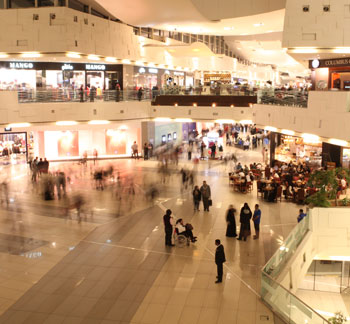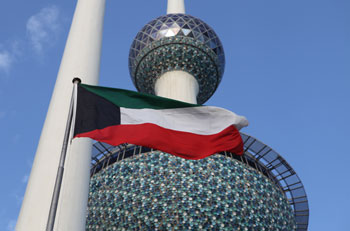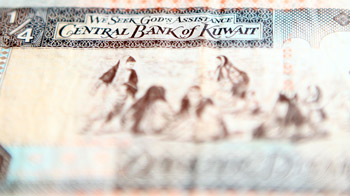Situation in Kuwait: Government, Economy and other Problems
Interview with Bader Al Humaidhi, Former Minister of Finance of KuwaitAccording to Mr. Al Humaidhi, the current situation in Kuwait is not very prosperous. Also, his outlook for the government and economy of Kuwait is not very positive. Is Kuwait awaiting difficult times?

What is the outlook of Kuwait’s economy for 2012?
If you ask me about the outlook of Kuwait for 2012, I cannot be very optimistic. Although the current situation suggests Kuwait is flourishing thanks to the higher prices of oil I am not very optimistic about the future situation in Kuwait. That is mainly because we have not yet diversified our sources of income, besides the oil industry. We do not have yet anything tangible for the development of infrastructure. Also, we have not yet implemented the five-year development plan as we were supposed to do.
Let us speak more about that plan which was adopted two years ago. What happened to it?
The plan by itself cannot be executed or implemented without the actual passing of certain laws, or without the modification of existing ones which are hindering those processes. Unfortunately, the situation is that the parliament, for the past year or year and half, has neither been ready nor has had enough time to pass the laws needed to implement or facilitate the implementation of the development plan.

Therefore, because of this situation in Kuwait, nothing has happened. There have only been talks about laws and new projects, but nothing has been actually done about it. I am not really optimistic about the plan and about this situation as a whole. None of our goals have been achieved. Contrary to that, some of the goals and some of the actions taken have upset the plan which was stated.
For 2012, what do you think will be the major problems the economy will face?
The problems are neither related to the economy nor to the finance. At the current situation, Kuwait does not really have any major money problems. We could say the problems we are facing at the current situation are rather of a political nature. What I hear from some of the candidates – in their statements or in their speeches – is that we have to attain a much better politics atmosphere.
I think we are going to have the same struggle as between the government and the parliament. The new parliament will waste time and spend all the money while only questioning the prime minister. As a result, it will not have enough time to focus on the development of Kuwait and the plan, the security and the infrastructure.
In 10 to 15 years from today, there might not be any oil left, given the direction that Kuwait is going now. Do you see the need for a wake-up call?
Let me tell you something: we have now reached a very difficult situation. Our budget for this year is approximately $92 billion, but the cost of oil is at $107 or $108 per barrel. The government has been able to collect only KD 18,7 billion to date. Maybe in the next three months, which is the remaining of the financial year, we might reach KD 23 or KD 24 billion but we really need to spend KD 20 billion. 80% of the budget goes for salaries and wages – these expenditures are unproductive. Only around 13% of the budges goes for investment and capital projects. In all truth, it is a bleak future.
A few months ago, I was thinking that we should be able to stand the problem in the course of the six or seven years to come. Unfortunately, I can say that in two or three years, maximum, we will be in a very crucial position.
If you ask me about the outlook of Kuwait for 2012, I cannot be very optimistic. Although the current situation suggests Kuwait is flourishing thanks to the higher prices of oil I am not very optimistic about the future situation in Kuwait.
When that time comes, we might not even be able to afford the salaries. For that very reason, I think that an important decision must be taken, either by the government or by the parliament, to orientate Kuwait in the best direction and put things the right way.
What do you think will happen to Kuwait, if this scenario situation plays out?
Demonstrations in the streets came to Kuwait in the last months or a year. There have been many of them during that period for different reasons. Some of the people participating in them are not citizens as you may have heard.
They asked, for instance, for the raising of salaries or wages. Of course, Kuwait enjoys many things which other countries do not know. We have a free press, free media as well as a parliament. We are a democracy, after all. Take the examples of such countries as Egypt, Libya and Syria – they do not have the benefits that we have.
In our case, people do not need to go out on the streets to ask for the things they need. They have the right to make that demand at the parliament. Therefore, I really wish to become optimistic, but this can only happen under three conditions.
Firstly, we need to stop asking for the raising of wages.

Secondly, we need to give more room to the private sector. The best years of Kuwait were those when the private sector had a major position in the state. After the liberation of Kuwait, the public sector took on a bigger role and, as a result, corruption started to increase.
Finally, in the next ten years, we will have 350,000 Kuwaitis seeking jobs. So, if no jobs are found for those people, we will have a severe social problems in the future. When such conditions are met, my view of the future situation in Kuwait might become more optimistic.
Is the business model of the private sector in Kuwait sustainable? For instance, what happens when the government is not investing into new technologies for the future?
In 1949, there was the first discovery of oil in Kuwait. Before that, the government had no other ways of income aside from taxation in the private sector. Therefore, before that year, most of the finances in the budget came from the private sector, either because of their activities in the trade or some other sectors.
In the fifties, even before the independence, the private sector generated the most of the economic activity and established the largest economic and financial entities in Kuwait. The private sector accomplished so much for the country, but then the government came and nationalized all of this for different reasons.
The private sector in Kuwait is very creative, very energized. It comprises many intellectuals. I would venture to say that it is the best private sector of all, as the largest investors are the Kuwaitis. But the government does not give them the chance to invest in Kuwait. What they do is that they take the money outside of the country instead of keeping it here like they should.
But there is a strategic, demographic challenge. The government, if I may say so, spoils the people who are not used to working. At the current situation, the government can barely afford the wages. Won’t there be strikes?
Of course and that is precisely what I’m worried about. The problem is that in the last two years, the government has increased the wages dramatically. In 1992, there was a law adopted which stated that every three years the government would have to review the salaries and wages according to the inflation rate.

If the government and the parliament had abided by that law, a lot of things would have been different. I don’t think there was such a huge need to increase wages. Now the government, pressured by the parliament, is still thinking of increasing salaries in the next month. Indeed, what are we going to do? This is what I am worried about. We have come to a point where we cannot afford salaries anymore. Unfortunately, the parliament does that while thinking about their election and not about the future situation in Kuwait.
I will give you an example. There is a university where the teachers’ salaries have increased by 70% to 80% in just one year. If you go around to Saudi, Qatar and other neighboring countries, I don’t think any of them can compete with Kuwait on that issue. That is what goes on in the public sector.
The situation now is that the private sector is hungry to help the people and the country, but they cannot do anything, simply because they are in no match with the salaries offered by the government. There has been a movement from the private sector to the public sector. That is what the government and the parliament aim for.
If I may add very quickly… Some of the members of the parliament, even a year back, asked for the cancellation of the custom laws. And now, these same people are candidates for the new election. This is crazy. This is one of the things I fought against in 2006. The proposal was thankfully defeated at the time, but it is being questioned again. There is an amount of $20 billion at stake.
At the current situation, some members of the parliament and even the population think that oil will never run out; that it will continue on forever. Oil in 1997 went down to 7$ and thus the government had to cut the budget by 25%.
I will give you another example: in ten years, our budget increased 400 times. The salaries and wages component increased by the same amount. In ten years. During that time, our budget was $92 billion. We need the price of oil to be at level of $400 for us to be able to pay for the budget. Who knows what might be the situation in the years to come? A hundred, a thousand?
The government in Britain or France knows what their target is for the next 10 years. They know they have to collect customs, taxes and invest. Even our investments are not in our hands. Kuwaiti investments are mostly in the US T-bills and EU government bonds. What if the market goes down or even collapses?
When we were invaded by Iraq the government was expected to feed Kuwaitis from outside as well as inside the country or to pay for the liberation of Kuwait. If the assets are going to be used to finance the government’s budget, nothing is going to be left. That is what the future of Kuwait is.